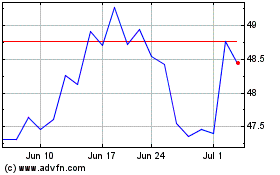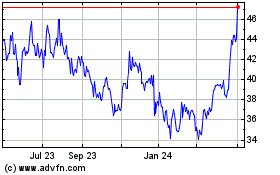By Joanne Chiu and Jing Yang
This article is being republished as part of our daily
reproduction of WSJ.com articles that also appeared in the U.S.
print edition of The Wall Street Journal (January 7, 2020).
Successful listings of shares in Hong Kong by Alibaba Group
Holding Ltd. and smaller rival Meituan Dianping have burnished the
market's high-tech credentials. Now, bankers and investors expect
more Chinese technology companies to list in the city.
Having more fast-growth stocks like these could rejuvenate a
stock market dominated by less dynamic sectors such as banking and
property, which include many mainland Chinese enterprises. That
would likely boost trading volumes to the benefit of both brokers
and the stock exchange, which has been working to lure more
technology and health-care businesses.
In 2018, the operator of Hong Kong's stock exchange changed its
rules to admit companies with unequal voting rights -- luring
groups with existing U.S. listings, like Alibaba, and unlisted
startups, like Meituan.
Alibaba's stock sale here eventually raised nearly $13 billion,
after the banks underwriting the deal increased the deal's size in
December.
Johnson Chui, head of equity capital markets for Asia Pacific at
Credit Suisse -- one of the two sponsors, or most senior banks, on
the Alibaba offering -- said the secondary listing reaffirmed the
city's status as an important fundraising hub. It gives larger and
more well-known branded tech companies the confidence that Hong
Kong is another option, other than the U.S., he said.
Bankers and investors say a colder U.S. environment, caused by
the U.S.-China trade fight, could prompt other Chinese companies
with New York-traded American depositary receipts to follow suit.
Sen. Marco Rubio (R., Fla.) has proposed legislation that could
ultimately lead to the delisting of some U.S.-traded Chinese
companies.
More than 20 large Chinese technology companies with American
depositary receipts could qualify for secondary listings in Hong
Kong, Goldman Sachs analysts said recently. The largest include
JD.com Inc., Baidu Inc. and NetEase Inc. Baidu and NetEase had no
comment. A JD.com spokesperson said it had no plan for a secondary
listing but would continue to observe market sentiment.
The other prize would be to persuade more unlisted groups, such
as Bytedance Inc., owner of video-sharing app TikTok, to follow in
the footsteps of handset maker Xiaomi Corp. and app operator
Meituan in making their first market debut in Hong Kong.
Shares in Meituan soared 132% in 2019, as investors grew more
optimistic about the outlook for the group, whose app allows users
to book services such as food delivery and hotels. That has given
the company, which floated in September 2018, a market value of
roughly $76 billion and made it one of China's most valuable tech
firms.
While Hong Kong's rule change allows companies with unequal
voting rights such as Alibaba and Meituan to list, they aren't
currently allowed to be in the benchmark Hang Seng Index. The Hang
Seng lagged behind many global peers in 2019 because of U.S.-China
trade frictions and local civil unrest.
The index's sole tech constituent is Tencent Holdings Ltd.,
potentially limiting its appeal to investors seeking to benchmark
their performance against a gauge that represents China's changing,
increasingly consumer-driven economy. Hang Seng Indexes Co. will
consult early this year about adding companies with dual-class
shares to its flagship index, which would bring it into line with
rivals such as MSCI Inc. and FTSE Russell.
For executives, part of the city's appeal is that mainland
investors can buy Hong Kong securities through Stock Connect, a
trading link with Shanghai and Shenzhen.
That lets mainland insurers and pension funds, which can't trade
U.S.-listed stocks, buy into offshore-listed Chinese tech, said
Adrian Mowat, chief strategist at CLSA, a Hong Kong-based
securities house known for its research and investor forums.
"Chinese investors will push the valuation higher than we're seeing
in the U.S. market," he said.
Sean Taylor, chief investment officer for Asia Pacific at asset
manager DWS, said many U.S.-listed Chinese companies were
domestically focused e-commerce, education and travel groups.
Having a Hong Kong listing could make the shares less vulnerable to
indiscriminate selloffs related to the trade fight, he said.
To be sure, Hong Kong will face competition as a listing venue
for Chinese tech from both the U.S. and from mainland China,
particularly Shanghai's nascent STAR market. Bankers say the choice
depends on factors such as a company's business model, global
ambitions and funding needs.
In addition, secondary listings will only work for larger
companies with actively traded stocks, said Jwalant Nanavati, head
of technology, media and telecom, for Asia ex-Japan in the
investment banking division of Nomura. "Most companies still prefer
to have only one listing," he said.
Write to Joanne Chiu at joanne.chiu@wsj.com and Jing Yang at
Jing.Yang@wsj.com
(END) Dow Jones Newswires
January 07, 2020 02:47 ET (07:47 GMT)
Copyright (c) 2020 Dow Jones & Company, Inc.
Tencent (PK) (USOTC:TCEHY)
Historical Stock Chart
From Oct 2024 to Nov 2024

Tencent (PK) (USOTC:TCEHY)
Historical Stock Chart
From Nov 2023 to Nov 2024
